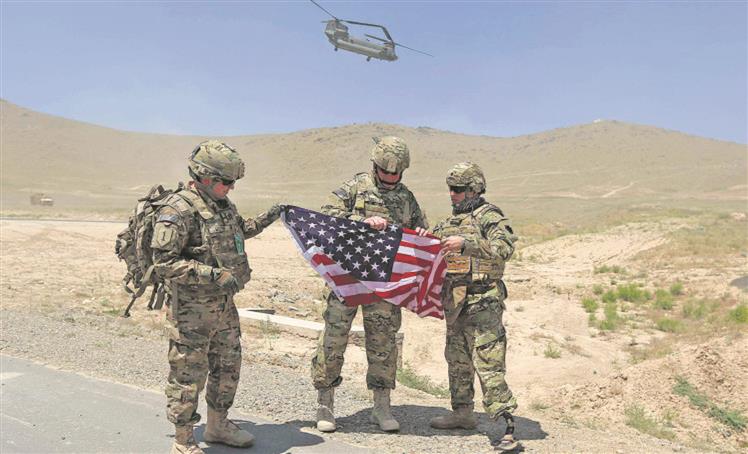India should draw comfort from the fact that it has been offered a seat on the decision-making table along with China, Russia, Iran, Pakistan and the US. This is a big opportunity, given the fact that India has been losing leverage in Afghanistan ever since the Taliban came back to battle in 2004, getting stronger and stronger. So, the issue for India is whether it should stick to its stance of loyalty to the Afghan government or be flexible in its approach.

WIST IN THE TALE: A few weeks before the day agreed upon for the withdrawal of US forces, America has come out with a new peace plan for Afghanistan. REUTERS

Afghanistan has been suffering for the past 40 years. Today, it is one of the poorest countries and has the highest daily death toll from militant violence and security forces’ killings. With a few weeks to go before May 1, the day agreed upon for the final withdrawal of American forces, the US has come out with its new proposal for peace in Afghanistan. Perhaps, no analyst would disagree that in the present circumstances there may be no solution to the problem without power-sharing with the Taliban.
The situation has been further precipitated by Donald Trump’s election agenda of withdrawing troops from Afghanistan. Unfortunately, he continued with the withdrawal even after he had lost the elections. If we go back to the time before the US elections were due in 2016, Barack Obama had planned to withdraw completely out of Afghanistan. But when he realised that doing so was against American interests, he changed the plan and left 10,000 troops in Afghanistan to keep the options open for the new President to be elected.
But Trump is made of a different clay. He has, unfortunately, tried to close down the options for Biden. As a result, much as Biden may desire to promote the western style of democracy, his options to put pressure on the Taliban stand constrained. A lot has been written about the details of the new plan of Biden as well as the bad optics of the language of the letter by Antony Blinken to Afghanistan’s elected President Ghani.
Biden’s plan needs to be viewed in the larger context of the limited options open to him. The plan, in essence, is an interim power-sharing set-up between the Afghan government and the Taliban, an essential revision of Afghanistan’s Constitution as well as the judicial system by commissions with members from the Afghan government as well as the Taliban. This exercise is to be followed by fresh elections in Afghanistan. A ceasefire has also been proposed in Afghanistan during this period.
Neither the Afghan government nor the Taliban are happy with the plan, though it is difficult to say if Biden can be faulted for his effort. There is a fair amount of public opinion in the US to get its troops out of Afghanistan and let the Afghans decide their own fate, irrespective of the course it may take.
Ghani secured his presidency last year for a further period of five years. He is obviously unhappy with the plan because if put into effect, he as well as his government stand to lose a lot. The harsh tone of Blinken’s letter to Ghani suggests that if he were not to accept the proposal, the US may have no option but to watch him thrown to the wolves, if the US is to complete its withdrawal as planned.
To be fair to Biden, the Taliban have been as much, if not more, pressured to agree to a ceasefire and also face a popular mandate. The Taliban’s only strength in this tug-of-war is the use of violence and, therefore, this proposal is anathema to them. The plan has built-in safeguards for women, human rights and a popular mandate of the people.
Given the animosity and distrust between the Afghan government and the Taliban, both can draw comfort from the fact that the US has proposed this plan to unfold under the supervision of the United Nations. This implies the deployment of a peacekeeping or, more aptly, a peace-enforcement contingent from different nations. The plan does seem to rely on a fair amount of wishful thinking, but Biden does not have a choice. It is difficult to think of any other better option under these circumstances for peace in Afghanistan.
India should draw comfort from the fact that it has been offered a seat on the decision-making table along with China, Russia, Iran, Pakistan and the US. This is a big opportunity, given the fact that India has been losing leverage in Afghanistan ever since the Taliban came back to battle in 2004, getting stronger and stronger.
So, the issue for India is whether it should stick to its stance of loyalty to the Afghan government or be flexible in its approach. The people in Afghanistan have suffered a lot. To help improve their sad plight, it may be more apt to take a humane approach.
No doubt, the Afghan government is an elected body, but one may also not overlook that the Taliban have come to enjoy a considerable following among the rural masses and cannot be wished away. It represents the Pashtuns, which is the biggest and most dominant ethnic tribe and has ruled Kabul in the past. The Taliban have also recently been taking recruits from all ethnicities, including the Hazaras, who are Shia Muslims.
So, if the Taliban agree to a ceasefire and also to take part in the elections, it may not be a bad option to work with them in the larger interest of peace.
Since a man of Biden’s sensibilities for democracy and human rights has come around to the above viewpoint, as is reflected in the proposed plan, India may also need to look at it with an open mind. It is logical to conclude that if we cannot wish the Taliban away, it is better to get them to agree to join the democratic process and moderate their policies.
One can also read between the lines: that if the Taliban do not agree, Biden, by floating this proposal, has created sufficient grounds for the US military to stay back in Afghanistan and continue with its military option against the Taliban. So, the plan has not only made Ghani’s position somewhat vulnerable, it has also put the Taliban in a tighter corner. It looks unlikely that the Taliban would agree to the proposal, unless the US shows its teeth by declaring its intention to stay put beyond May 1. Even with that option, finding a solution to the Afghan problem is a tall order.
In the past, India had good reasons for not getting involved militarily in Afghanistan, but as a part of the UN contingent, it is a good opportunity to send troops to Afghanistan. This is likely to give India more leverage in Afghanistan against Pakistan than what it has today. Its soft power in Afghanistan will multiply manifold if it is able to put boots on the ground under the UN mandate. Its presence will help take care of its immediate interests as well as build a lasting relationship with Afghanistan, irrespective of the composition of the future governments.
